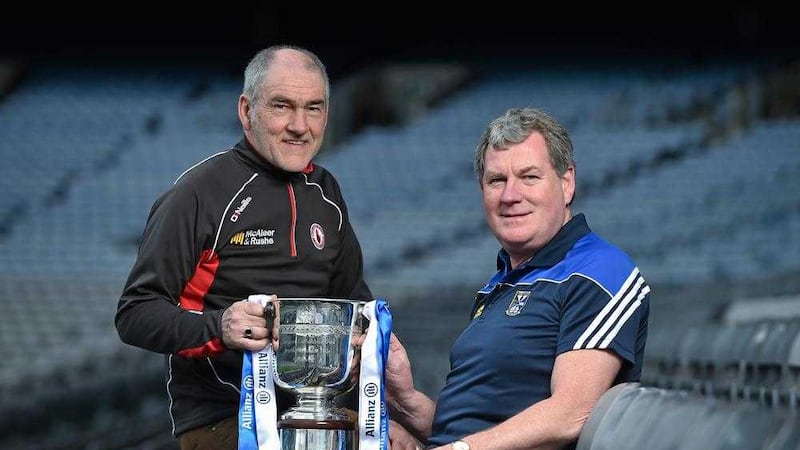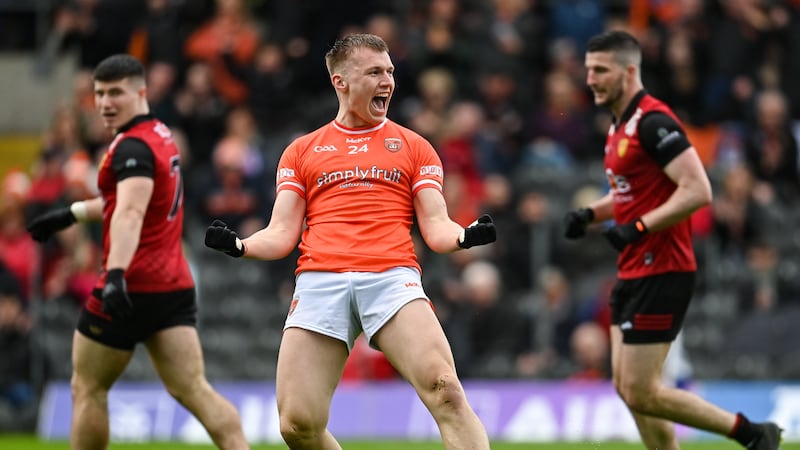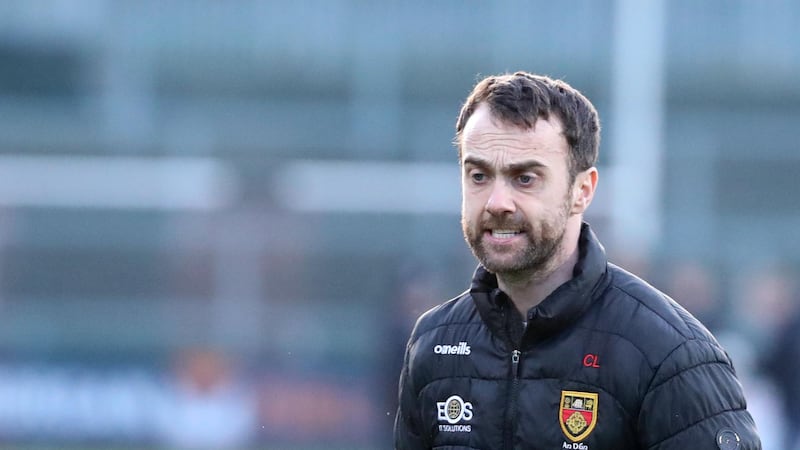“Intelligence is the ability to adapt to change.”
Stephen Hawking
THERE’S no way you get through 14 years of inter-county managing without adapting to change.
That has been Mickey Harte’s latest task.
For the first decade of his tenure in Tyrone, he was the one setting the template.
Gaelic football evolved to meet the standards set by his teams. The standards of workrate, intensity, fitness.
He was blessed with a glorious squad of players, but the All-Ireland titles of 2003, 2005 and 2008 owed as much to innovation and perspiration as inspiration.
Does he see a certain irony in the make-up of the current Dublin and Kerry systems bearing characteristics of the often-lambasted Tyrone style, he is asked, and he can’t help but smile.
“People do adapt to what they see as successful, and what players they have at their disposal. And I think Dublin and Kerry are most adept at doing that, seeing what the modern game demands,” he said.
“We all try to learn from the past, not become clones, and I’m not saying they copied anything we did, but they’ve learnt from us, and we learn a bit from them.”
Those high-intensity traits are now imbued in the sport. The first prerequisite for any team, inter-county or junior club, is workrate. Without that, there is no hope.
Tyrone have never lacked it, and it’s largely because of their manager.
A squad of players whose core produced those three All-Irelands began to break up after the 2009 semi-final defeat by Cork.
The Ulster title the following summer remains the county’s last major piece of silverware.
Defeat at home by Armagh in a qualifier in 2014 spelled the end for Conor Gormley and Stephen O’Neill.
Bullied around their own turf, Gormley spoke just before his retirement was announced of the need for some serious strength and conditioning work.
Two years down the line, it’s fairly obvious that advice has been heeded.
Taking heed of Peter Donnelly’s achievements in Cavan and bringing him home has had a huge impact on their progression.
Tyrone are close on the fittest team in Ireland at this point in time.
“The good thing is that he’s not only a strength and conditioning coach, but he’s a Gaelic football strength and conditioning coach,” said Harte.
“His mindset is ‘I’m a Gaelic footballer first of all, and I know what Gaelic footballers need to develop into being the best they can be’.
“That’s the real secret of Peter Donnelly, he’s got the head for the game, he’s played it at a high level and created his training programme to meet the demands being made of football players today.
“I’m not so sure it’s all about the strength coming on all of a sudden though. That develops over years. When people do something over a prolonged period of time, they get physically stronger anyway.
“These things take time. Young players don’t bulk up all of a sudden. It might take one year for some, two years for others, three years for others, to get to the level they need to be at to withstand the intensity of the physical nature of today’s game.”
They’d had the 2008 and 2010 All-Ireland minor successes to suggest that there was fresh fruit ripening.
From there, new leaders have begun to emerge. For while the decision of Sean Cavanagh and the two McMahons to plough on for another season was important, the curtain is starting to come down.
Be it next year or the year after, there will come a first team meeting that brings the realisation that they have gone stage left.
The ambition of their youth matches the ability. They are not content to bide their time. They want to play now, and they will work to ensure it happens.
“The emergence of people like Rory Brennan, Mark Bradley, Conor Meyler, these are the kind of people who have the quality to make a difference on a senior inter-county team.
“Whereas before, you might have had people who could come in and play some role, but those are players who definitely are starting material in the not-too-distant future.
“When they fill out enough to play at this level, to make the transition from underage to adult football.
“When they do that, they set the tone for other players, that this is what it takes to be part of this team, to start, and not just be a player who’s biding his time to get a few minutes.
”The likes of the Mattie Donnellys and Petie Harte and Ronan McNabb before he got injured, off the minors in ’08, have very much matured into team leaders. Tiernan McCann and people like that have come along a little bit behind them.
“There’s a lot of players at various stages of their development and it’s coming together quite well.
“But it’s also results that talk. Potential’s potential, but results say you are fulfilling your potential.
“There’s lots of things to be answered yet. We’re maybe sitting on the cusp of something decent, but one or two games can turn that on its head.”
It was evident from day one last year that Harte had a vision of how he wanted his side to play.
Even on the winter sod, they were bringing 15 men behind the ball. The explosion wasn’t in the legs at that time of year but as the ground toughened, the thoroughbreds began to shine.
They still hadn’t hit peak form when they travelled to Ballybofey, and the width of the crossbar denied them.
But such was their belief that they regrouped, blitzed their way through the qualifiers and ended up kicking themselves over squandered goal chances against Kerry in the All-Ireland semi-final.
The fitness levels needed to play this style of game are frightening. They sit back in their pod, ready to force the turnover in their own territory and then, bang! Away in numbers.
Like the Donegal team of Dublin fame in 2014, they go in waves, support runners from every angle. It’s electrifying to watch at times.
And if they see fit, Sean Cavanagh can still go at the head of a ball-winning full-forward line.
Adaptability, see. Tyrone now fit the shape of the modern game.
“There is no point in doing the things you used to do and expect to get the same results. You're going to get the same results if you keep doing the same things. So I have to be thinking differently.
“I have to open my mind to new possibilities. I have to look at individual players and deal with them.
“There are a load of new people in now. For a long time I was dealing with people that I had from minors and U-21.
“Now the big majority of the team I never had right through the underage structures so I have to build new relationships with them, learn more about them, learn more about myself as I go along. It is a constant process of trying to add value to what you are about as an individual.”
Praising Gavin Devlin and Peter Donnelly’s input in the recreation of their style, Harte admitted to being proud of taking a new team, developing a new style of play and bringing them back among the elite.
“They [the players] know that our minds are never still in terms of the coaching that we are thinking about.
“We are presenting to them ways of playing as an individual and collectively as a team and trying to create some kind of adaptability as a team, that you are not just a one-trick pony.
“You have other things you can do on any given day. That's a continuous process and we enjoy the challenge of that.”
And himself, a better manager now than the man who brought his county to the holy grail, and then repeated it twice more?
“I’m obviously a lot more experienced. On reflection, I made plenty of mistakes when we were winning. They weren’t highlighted as much, but when you’re not winning, the mistakes are highlight, by forensic scientists.
“I feel I’m a wiser manager now, even though I mightn’t have as many All-Irelands as I had then. But I want to put that learning into practice, to be in a better place.”
The wounds of the Kerry defeat were quickly bandaged. Just three days after that game, Harte brought his squad together for the first look at 2016.
The diversion will not knock them off course.
It’s Cavan up on Sunday, a side they’re also on course to meet in a potential Ulster semi-final.
Few will remember as the months tick by that Tyrone are Ó Fiaich and McKenna Cup winners from earlier in the year, the latter for the fifth successive year.
Fostering the mentality that victory is essential no matter what the occasion is another great trick that Harte has managed to conjure.
“I don’t think you can switch on the winning mentality when it suits. I think you’ve got to want to win every game you play in.
“And if people come to support you they deserve the best, pay through the gates, take pride in the team. It’s a bad mentality to say any game is less important than another.”
When they aren’t bringing change about themselves, Mickey Harte and Tyrone are adapting to it. Little wonder they’re back at the forefront of Gaelic football.








